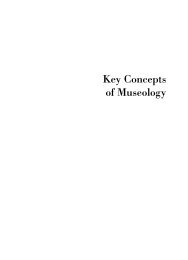ISS 25 (1995).pdf - The International Council of Museums
ISS 25 (1995).pdf - The International Council of Museums
ISS 25 (1995).pdf - The International Council of Museums
Create successful ePaper yourself
Turn your PDF publications into a flip-book with our unique Google optimized e-Paper software.
Which museums for which communities ?<br />
Mathilde Bellaigue<br />
Laboratoire de recbercbe des musees de France, Paris<br />
Ab s tract<br />
From the XVIIIth century in Europe, the history <strong>of</strong> museums sbows how their audience was<br />
borne and bow it evolved until now. In France, the left government <strong>of</strong> 1936, then the Second World<br />
War and, last but not least, the events <strong>of</strong> 1968 opened the way to various education folk movements.<br />
<strong>The</strong> wave <strong>of</strong> French ecomuseums and foreign community museums came out from there. New words<br />
were brought forth in the museum field, such as identity, territory, participation, community. Such<br />
experiences were taken up in the world, especially in countries recently free from colonialism or<br />
dictatorship. But, in the eighties, the Frencb cultural policy shifted, introducing the notion <strong>of</strong><br />
producing money and necessary rentability <strong>of</strong> the museums. Together with the industrial crisis in<br />
textile, steel, and coal, industrial archaeology appeared, involving both the museologists and the<br />
ancient actors <strong>of</strong> sucb activities and extending the notion <strong>of</strong> beritage to their materials. Sorts <strong>of</strong><br />
memory communities were issued from there.<br />
In France, during the eighties, the accent was put upon prestigious architectural projects <strong>of</strong><br />
museums and the necessity for cultural organisations to produce thier own financial resources. <strong>The</strong><br />
.notion <strong>of</strong> community was no longer put forward.<br />
To-day, worldwide communication leaves no more spaces, no more things to be discovered. We<br />
must re-consider the role <strong>of</strong> artefacts in museums as much as our own attitude towards them.<br />
Traditional communities bave split, individualism has got stronger. Are there new museums for new<br />
communities (scbools, tourism, old people) ? Looking at the exclusion phenomena, we find new<br />
groups : illiterates are standing out <strong>of</strong> the community <strong>of</strong> educated people, as well as immigrated<br />
people are rejected by the nationals, and unemployed people remain out <strong>of</strong> the working community ...<br />
How can museums cope with that situation? Are there new forms <strong>of</strong> museal action to imagine?<br />
April <strong>1995</strong><br />
36
















